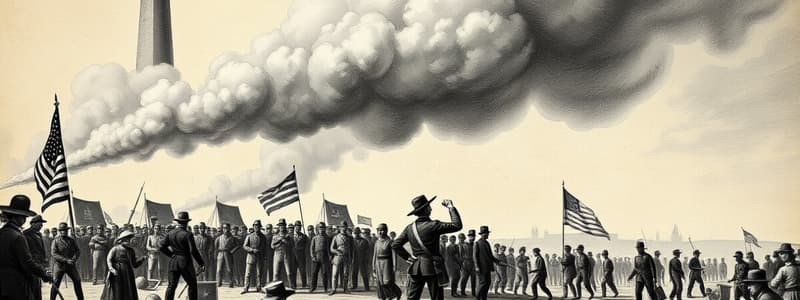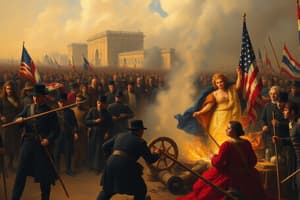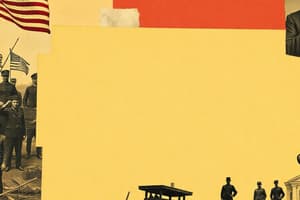Podcast
Questions and Answers
What was the purpose of Reconstruction?
What was the purpose of Reconstruction?
- To abolish slavery
- To restore southern states to the Union (correct)
- To expand westward
- To establish new governments in the South (correct)
What did the Emancipation Proclamation accomplish?
What did the Emancipation Proclamation accomplish?
Committed the United States to the abolition of slavery.
What was the Thirteenth Amendment?
What was the Thirteenth Amendment?
Legally abolished slavery.
Who assassinated Abraham Lincoln?
Who assassinated Abraham Lincoln?
Who became president after Lincoln's assassination?
Who became president after Lincoln's assassination?
What were Black Codes?
What were Black Codes?
What was the role of Thaddeus Stevens?
What was the role of Thaddeus Stevens?
What did the Fourteenth Amendment do?
What did the Fourteenth Amendment do?
Who was Ulysses S. Grant?
Who was Ulysses S. Grant?
What did the Congressional Reconstruction Acts achieve?
What did the Congressional Reconstruction Acts achieve?
Who was Hiram R. Revels?
Who was Hiram R. Revels?
What was the purpose of the Freedmen's Bureau?
What was the purpose of the Freedmen's Bureau?
What did the Women's Loyal National League advocate for?
What did the Women's Loyal National League advocate for?
What were the Enforcement Acts?
What were the Enforcement Acts?
What was the significance of the Fifteenth Amendment?
What was the significance of the Fifteenth Amendment?
The __________ Act aimed to distribute land to freed people.
The __________ Act aimed to distribute land to freed people.
Flashcards are hidden until you start studying
Study Notes
Reconstruction
- Initiated by Abraham Lincoln to restore southern states to the Union and redefine African Americans' societal role.
- Began in Fall 1863, allowing Southerners to pledge allegiance and form governments after 10% of voters took an oath.
Emancipation Proclamation
- Abraham Lincoln's declaration to abolish slavery in areas of rebellion.
- Limited impact as it only freed slaves where the Union had no control.
Thirteenth Amendment
- Passed by Congress on January 31, 1865, abolished slavery except as punishment for crime.
- Freed approximately 4 million slaves by year-end.
John Wilkes Booth
- Notable actor and supporter of the Confederacy, assassinated Abraham Lincoln on April 14, 1865.
Andrew Johnson
- Became president after Lincoln's assassination in April 1865.
- Initially served as vice president before his ascent to the presidency.
Black Codes
- Laws enacted by Southern governments to control Black behavior and establish social hierarchies.
- Granted rights like property ownership but restricted freedoms including jury service and mobility.
Thaddeus Stevens
- Republican Congressman advocating for racial equality and African American voting rights.
- Responded to oppressive Black Codes with the Civil Rights Act of 1866.
Fourteenth Amendment
- Ratified on July 9, 1868, granted citizenship and due process rights to all born in the U.S.
- Overrode President Johnson’s veto, reflecting the federal government’s commitment to civil rights.
Ulysses S. Grant
- Former Union General who ran on the campaign slogan “Let Us Have Peace” during the 1868 presidential election.
Congressional Reconstruction Acts
- Enacted by Republicans in 1867, these acts dissolved Southern state governments and required ratification of the Fourteenth Amendment for reentry into the Union.
Hiram R. Revels
- One of the first Black U.S. Senators from Mississippi during Reconstruction.
P.B.S. Pinchback
- Briefly served as Louisiana's Governor and was the first African American to hold a state governorship until L. Douglas Wilder in 1989.
Special Field Order No. 15
- Issued by General William T. Sherman, aimed to allocate land in Georgia and South Carolina for freed slaves.
- Ultimately ineffective due to lack of legal authority for land redistribution.
Freedmen's Bureau
- Established to assist former slaves in reclaiming land and securing fair labor conditions.
- Faced challenges, as many former slaves were told to return to former owners for work.
Oliver O. Howard
- Key figure associated with the Freedmen's Bureau.
Booker T. Washington
- Influential African American leader who promoted vocational education for Blacks post-Civil War.
Fifteenth Amendment
- Designed to protect African American men's right to vote, passed during Reconstruction.
Jim Crow Laws
- Enforced racial segregation and discrimination in the Southern United States post-Reconstruction.
Elizabeth Cady Stanton
- Advocate for women's rights, played a crucial role in forming the Women's Loyal National League.
Women's Loyal National League
- Founded by Stanton, focused on petitioning Congress for an amendment to abolish slavery.
- Celebrated success with the passing of the Thirteenth Amendment.
National Woman Suffrage Association (NWSA)
- Formed by Stanton and Anthony, opposed the Fourteenth Amendment’s male-only voting rights.
- Promoted the idea that women’s rights were inherent and should be recognized.
Civil Rights Act of 1866
- Congress's first attempt to define American-born residents as citizens and protect their fundamental rights.
- Excluded Native peoples from its provisions.
Ku Klux Klan
- Formed in 1866 in Pulaski, Tennessee, as a response to Black empowerment during Reconstruction.
- Spread terror through violence and intimidation against African Americans and their allies.
Enforcement Acts
- Implemented in 1870-1871 to combat KKK violence and protect African American civil rights.
- Allowed federal troops to intervene against acts of rebellion but ultimately failed after 1876.
Morrill Land Grant
- Legislation that provided land for the establishment of colleges, promoting education in agriculture and mechanical arts.
Homestead Act
- Encouraged westward expansion by granting land to settlers willing to develop it.
Rutherford B. Hayes
- Elected president in 1876 amidst controversy and disputes regarding the election results.
Samuel J. Tilden
- Opponent to Rutherford B. Hayes in the disputed 1876 presidential election.
Compromise of 1877
- Political agreement that resolved the 1876 election dispute, resulting in the withdrawal of federal troops from the South and effectively ending Reconstruction.
Studying That Suits You
Use AI to generate personalized quizzes and flashcards to suit your learning preferences.




